On this page:
- The uniqueness of the school
- Tuition
- Languages
- Two high school diplomas
- Students and teachers
- Recruitment
- Difficulties/challenges
- Achievements

Our Kids talked with Krzysztof Felpel (KF)—Kolegium Europejskie’s chair of the board.
The uniqueness of the school
Our Kids: What's special about KE in Kraków?
KF: The special character of KE has several dimensions. The most important are its educational and social dimensions. As for the former, our school was the first one in the region and in Kraków to introduce the IB programme. We’re celebrating 15 years since our IB programme was set up, in our region and in Kraków, and we were the first ones to implement it.
The key advantage of the IB programme is teaching all subjects in English.
The social aspect is the multi-ethnic and multicultural character of our school. It’s because of the unique character of our IB programme that our school is attended by children from all over the world. Not every child knows Polish, and some students speak it, but not very well. Thanks to classes conducted in English and the option of taking the school-leaving exam in this language, they can achieve great academic results. For people who do not know English so well, we run a very intensive English program in the first two years of education at our school. We have children from 26 countries, including Canada, the US, China, Korea, Vietnam, Japan, Iran, South Africa, Uzbekistan, Brazil, Great Britain, Italy, and elsewhere. Here, nobody feels new or like a stranger. Sometimes we call our school a cultural melting pot. In our schools, students learn to be open to other cultures and values, to respect other people—their views and different beliefs.
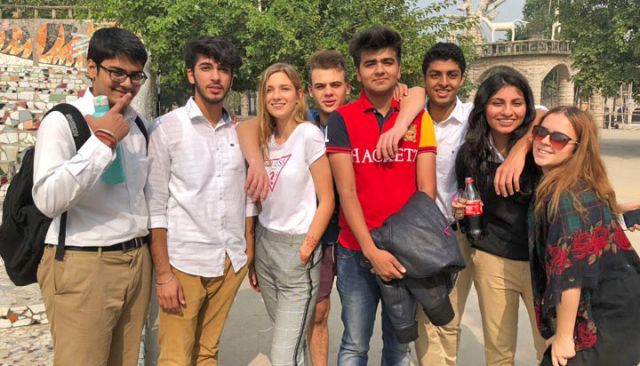
Because of this, we also get young people who had problems in other schools, for example, because of their skin color or cultural differences. For us, diversity is the norm. Young people from other countries receive support, care, and extra classes to make up for problems in some subjects. They also receive Polish as a foreign language lessons. Our atmosphere is very special—it's based on mutual respect. Our elementary school and high school are attended both by finalists and winners of subject competitions in various fields, by children who have special sports talents and represent Poland abroad, as well as by musically talented children. Half of our students are Polish, and this international setting helps them learn English faster, because the most important thing is this daily contact with the language.
Our Kids: Among the schools that offer the IB programme, in what way does KE stand out?
KF: IB schools prepare students for further studies and future life, and teach them independence. We go a step further. Most students, when they choose high school, don't have specific plans for the future. They don't know what jobs they want to do or what they want to study. Our school creates interests in these young people, inspires them, and helps them choose their future careers by offering them non-standard activities, such as a live lesson with the space station, visiting the Jefferson Museum on the research station in Spitsbergen, participation in university seminars, as well as meetings with unusual people, such as winners of the Pulitzer Prize.
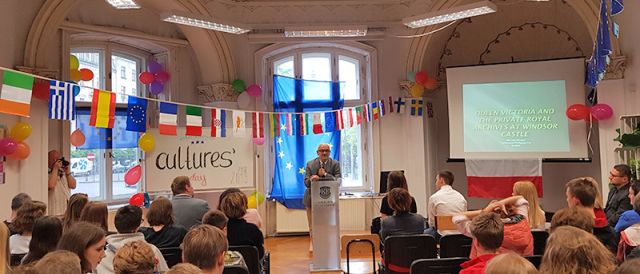
Our school also organizes many exchanges with other schools in the world, in countries such as India, Italy, and China, among others. There’s an English-language theatre in our school, and we run classes that teach students to write their curriculum vitaes and letters and essays which help them to get into universities all over the world. Students learn presentation, public speaking, and many other skills.
Young people who are interested in business can participate in our business game. During classes we create a business simulation—the virtual running of a company. Students set up companies, compete for recruiting virtual clients, make decisions about their business offers, prepare and equip job stations, hire and motivate employees, choose suppliers, do public relations, set prices, establish marketing policies, and more. In this way, they develop their analytical thinking skills, practice drawing conclusions from feedback, and practically learn how to run a business. We're fully convinced that the program we implement in our school, together with the international diploma, is the best start to the future for a young person—after all, IBDP graduates are in high demand at universities all over the world.
It's the IBDP that allows us to educate a young person who will know how to study and work with people from many different cultures, ethnicities, and religions.
Tuition
Our Kids: Is KE a school for elites?
KF: No, if we're talking about limiting the access by high tuition, but yes, if we’re talking about high education standards and educational elites formed as a result of the IBDP. We recruit extraordinary young people, open to knowledge and to others. These are young people who want to grow, learn new things, gain knowledge about the world and other people, and who are not afraid of challenges and hard work.
Many parents ask us if we only have children from the wealthiest families or only winners of various subject competitions. No, that's not the case. As I said, our students are young people with different interests and very different talents and skills.
We don't have fashion shows—our students come to school dressed casually, sometimes in our school sweatshirts or T-shirts. This means that all the students feel good. We have multiculturalism in our school, but a normal one, without showing off.
Our Kids: How do you manage to keep the tuition at a relatively low level?
KF: It all depends on one's priorities. For us, the priority is not a fantastic building (although we can say with great pride that our school is located in an old 19th-century palace in the very center of Kraków, just by the main square and the railway and the bus station). For our board and the principal, the most important thing is the future of our students. We have excellent teachers who have exactly the same priorities as the school, which was the first in our region to introduce IB, so we have extensive experience. We’re the most dynamically developing IB school in Kraków, and we’re becoming one of the biggest IB schools in Europe.
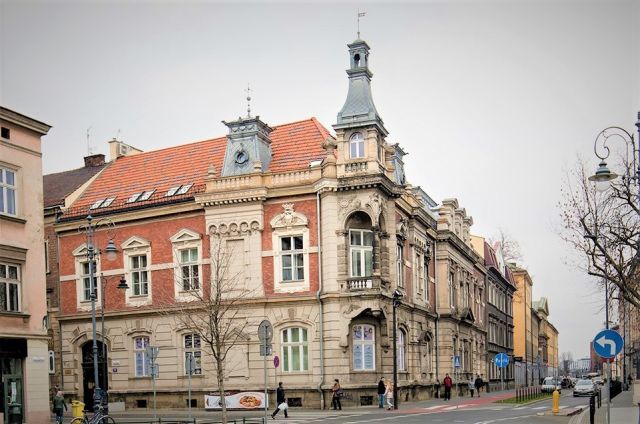
Languages
Our Kids: Your school offers other languages apart from English. What does the language education look like in KE?
KF: Apart from English, children can choose French, Spanish, German, or Russian at various levels. They communicate fluently in several languages, and English is at a very high level, because it’s the language of instruction in the last IB grades and for the English-speaking students starting from their first year of high school. It’s very important because we want no barriers that would make it impossible for our graduates to study anywhere in the world, for example, deficiencies in psychology, business, economics, or other subjects.
The world definitely opens up to them. They have a great advantage over their peers. For example, our students who study business or psychology find it a lot easier because, apart from regular IB subjects, we have a wide range of professional subjects: business management, economics, psychology, computer science, visual arts (with elements of painting, sculpting, and computer graphics), etc. For two years, students study the subjects in English, so when they continue to study at university, they have an advantage over those who never studied the subjects.
Two high school diplomas
Our Kids: Your students can choose between the Polish and the international high school diploma.
KF: Yes, but the interest in the Polish stream is relatively low when you know the advantages of the other stream.
Our Kids: Your students can also take advantage of various study trips and exchanges.
KF: We take our students to many exchanges abroad. We have partnership contracts signed with schools all over the world. Students from IB1 and IB2 classes most often choose exchanges with schools such as ours which have IBDP. It's very good for them because apart from sightseeing and getting to know another culture, they participate in regular classes in exactly the same subjects they study here.
For example, in the last two years, we've visited two prestigious IB schools in India. As far as the pre-IB classes are concerned, the students usually choose short-term trips to two schools in other European countries. An example is our partnership with a school in Tuscany (the town of Empoly, which belongs to the city of Florence). We’re happy we also have partnership agreements with many schools in China, mostly in Beijing—medical, business, and IT schools. These are well-known schools which have huge campuses and very modern teaching and sports facilities.
Our Kids: And what are the benefits of these partnerships for the students?
KF: During the exchanges, students have a very rich program. They do sightseeing, get to know the culture, participate in interesting classes, and make use of the wide range of resources each school offers. For example, in Beijing schools, they can participate in lessons in labs where they conduct virtual surgeries or participate in virtual chemistry labs where incredible experiments can be carried out. In IT schools, we have access to databases, e-commerce platforms, and more. Some Chinese schools have resources and equipment which can only be dreamed of in European schools.
We also collaborate with many universities from all over the world. Recently, we hosted Professor Maria Rosario de Guzman from Lincoln University in Nebraska, who came with a group of four PhD students and conducted workshops for our students in social science and business. Later, our students had a chance to continue collaborating with the team on research projects at their university, which is an amazing way of building up their own portfolio, and which can be useful when applying to university. We also have contracts with several medical universities, which guarantee our most gifted students spots without entrance exams at medical, dentistry, and pharmacy departments. Apart from this, we have partnerships with other universities, where they function as patrons of our school or a particular class.
Our Kids: Your school is associated with UNESCO. What does this mean in practice?
KF: We collaborate with many schools in the world, carrying out international projects and participating in various campaigns. We have a digitization coordinator who’s an expert in modern teaching techniques and collaborates with the best teaching specialists in the world. We treat those teachers as models, and we’re always interested in what’s going on elsewhere.
Students and teachers
Our Kids: What’s the percentage of Polish students in your school?
KF: We have half Polish and half international students.
Our Kids: After graduation, do most of them study abroad?
KF: About 70%. Those who choose Polish universities usually decide to study in English—they don't want to forget the language.
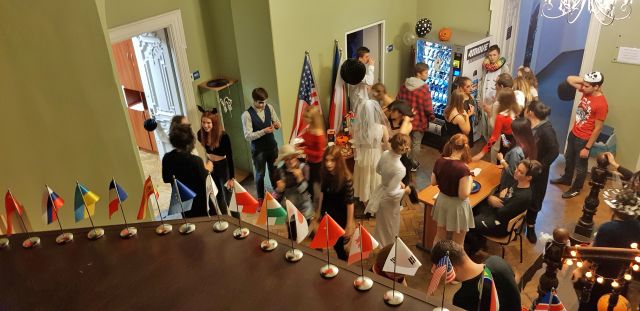
Our Kids: And who are the teachers?
KF: Most of them are Poles. Why? Because our system is divided into two parts. The first one is pre-IB classes, which prepare students for the IB diploma, while the second one is the last two years of the IBDP, which finishes off with the international diploma. At the pre-IB stage, it’s important for us to have teachers who are bilingual because we have classes where 100% of instruction is done in English (with only Polish-language lessons in Polish), but we also have classes with just 30% of English, where 70% of the instruction is in Polish, with English gradually introduced so that eventually it becomes the main language of instruction. Therefore, we need teachers who also speak Polish. In our faculty, we have excellent practitioners: for example, our business management and computer science teacher also works in a large corporation. We also have teachers with PhDs who lecture at universities.
Recruitment
Our Kids: You also run a bilingual elementary school, so I understand that children who go through the whole cycle get to your high school without any problem. What about children who want to get to your high school, but did not go through your elementary school? Do they need to take entrance exams?
KF: Children who attend our bilingual elementary school, as everywhere else, have to take a Grade 8 exam. Those who went through our elementary school get to our high school without entrance exams. Candidates who come from outside take entrance exams, and we take into account their average from the previous grade as our recruitment criterion.
More and more international students come to join our international elementary school, which has bilingual classes, as well as our high school, with its IB diploma. The number of international students keeps growing. Recently we've had some new children from the US and India. The interaction with children from various parts of the world creates a fantastic atmosphere and facilitates learning English by Polish-speaking children and Polish by English-speaking children.
We offer an extended number of classes in English—eight hours a week from Grade 4 to 8, which includes classes with native speakers, where specialized vocabulary in each subject is included, and it helps them make quick progress in the language. Another foreign language—French, Spanish, or German—can be chosen starting in Grade 4. In Grades 1 to 3, there are five hours of English a week and one hour of Spanish. English-speaking children have more Polish as a foreign language, which is taught by specially trained teachers, as well as makeup classes in math and science, written tests in English, as well as materials and presentations in English.
At present, we’re introducing a custom-made program from England and for the English-speaking children we will implement parts of the UK National Curriculum. We also want to complement the Polish curriculum with some elements included in the British curriculum. We're talking about selected elements—math or science subject groups at 5 to 8 hours a week for the youngest children and slightly more in higher grades. In Grades 1 to 3, we have a morning and an afternoon snack for children, and all the students in elementary school are provided with after-school care.
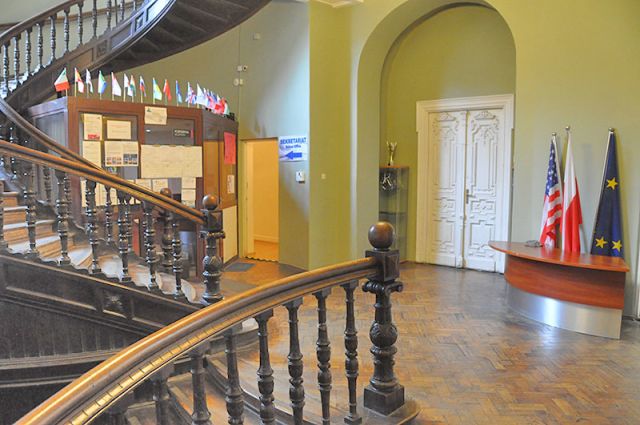
Our Kids: Do you have many candidates interested in your school?
KF: Oh yes, and that number grows every year. We have many applications from other countries, sometimes filed two years in advance.
Our Kids: Do you have enough space for such big growth?
KF: Yes. Our school is located in the center of Kraków in a beautiful old building overlooking the Florian Gate. The kids love our building which has a wonderful atmosphere.
Difficulties/challenges
Our Kids: What are your greatest difficulties or challenges?
KF: The biggest challenge is to secure accommodation for children who come to study at our school from abroad.
Achievements
Our Kids: What are you most proud of?
KF: I'm proud of creating this international atmosphere in our school. Sometimes parents ask me about violence, but we don't have this problem and I appreciate that a lot. Another thing is that our students don't spend their lives engaged in social media, locked at home in front of computer screens. Our kids love to integrate, spend their holidays together, and go out together to various events and courses.
In June, 2019, we were the organizers of the first international Oxford Debate in English attended by many schools. Too bad that a school from India could not be with us, because unfortunately they didn’t get their visas on time. It's wonderful that in these days of violence our kids can compete in the cultured way and learn the art of argumentation.
A few of our students have received scholarships at prestigious international schools in appreciation of their academic, organizational, and community work. Although we have to part with them, we’re happy, congratulate them on their success, and wish them all the best.
Two of these students are:
Victoria Prokocka: Pre-IB student who got a two year scholarship at Impington Village College in Great Britain. She was very active in the children's and youth parliament, and collaborates with the Youth European Parliament in organizing a number of events. She is the District Coordinator and Press Secretary of the Polish Youth Parliament, the largest discussion panel of young people in Poland. She’s also a finance committee member of the Youth Council of Kraków and a member of the pro-European Organization of Young European Federalists.
Bartosz Kuklinski: He received a two-year scholarship at Windermere School in Britain. He won the main award at a competition organized by the Pedagogical University for “the best run virtual company.” He was one of the finalists of the United World Colleges’ competition. He won the competition for a British Alumni Society scholarship. In the last year, he was a finalist in 13 competitions at various regional levels, in subjects such as math, biology, and art.
People who read this also viewed:
- Warsaw private schools
- Kraków private schools
- Poznań private schools
- Wrocław private schools
- Łódź private schools
- Rzeszów private schools
- Gdańsk & Gdynia private schools
-
Advice Guide
- ABC of educational terminology: Glossary of terms and concepts
- The admissions process
- Advantages and disadvantages of studying in an international school
- The application process
- Benefits of Polish private schools
- Bilingual schools
- Boarding schools
- Choosing a private or nonpublic school in Poland
- Compare schools in Poland
- English schools in Warsaw
- Homeschooling
- International schools in Kraków
- International schools
- Private school interviews
- Music education
- Myths about private education
- Non-public schools in Poland
- School open houses
- Our Kids Interview: Get to know EF Academy Oxford
- Our Kids Interview: Get to know Open School
- Our Kids interview: Get to know Regent College International Schools
- Our Kids Interview: Get to know The American School of Warsaw
- Our Kids Interview: Get to know The British School Warsaw
- Our Kids Interview: Get to know Wrocław Cosmopolitan School (two interviews, new video)
- Poland school profiles
- Private day schools
- Gifted schools & programs
- Private Jewish schools in Poland
- Language schools
- Private school tuition and costs in Poland
- Private schools in Poland
- Private schools in Poland offering French-language immersion
- English immersion schools
- Poland school uniforms
- Private special needs schools in Warsaw
- Public versus non-public schools in Poland
- Private school questions
- Private school rankings
- Reasons for choosing private schools - Our Kids’s survey report
- Religious schools
- Schools and classes for children with ADHD in Poland
- Social primary schools
- Social Schools
- Special educational needs (SPE) certificates
- Special needs schools
- Study abroad at a private school
- The first annual non-public school fair in Poland
- The first annual Our Kids non-public school expo in Warsaw was a great success
- Third Private School Expo in Warsaw - summary
- Types of schools
- Types of schools in Warsaw
- Warsaw preschool costs
- Why private school?
- Why parents go private
-
Grades
- Boarding high schools
- Choosing a high school in Poland
- Mokotow High School Campus - a new Warsaw high school and Thames British School campus
- Montessori nursery schools
- Montessori preschools
- Our Kids Interview: Get to know English Montessori School Katowice
- Our Kids Interview: Get to know FSA School
- Our Kids Interview: Get to know KIDS & Co.
- Our Kids Interview: Get to know Polish British Academy of Warsaw
- Our Kids Interview: Get to know The English Playhouse and The English Primary
- Poland education: grade levels
- Preschools in Warsaw
- Private & non-public preschools
- Private & non-public primary schools
- Private bilingual elementary schools in Warsaw
- Private high schools
- Private high schools in Warsaw
- Private middle schools
- Nursery schools
- Private primary schools in Warsaw
- Social high schools
-
Locations
- Boarding schools in Warsaw
- English schools in Kraków
- International Baccalaureate (IB) schools in Warsaw
- International schools in Warsaw
- Montessori schools in Warsaw
- Non-public schools in Warsaw
- Our Kids Interview: Get to know EF Academy
- Our Kids interview: Get to know Excellence in Education better
- Our Kids Interview: Get to know PRIMUS Non-Public Primary School No. 47 and Non-Public Secondary School
- Our Kids Interview: Get to know the Canadian School of Warsaw
- Our Kids Interview: Get to know The Primary and Secondary Schools of the Sisters of Nazareth in Warsaw
- Private Catholic and Christian schools in Warsaw
- Private day schools in Warsaw
- Private language schools in Warsaw
- Private schools in Bialystok
- Bydgoszcz schools
- Częstochowa schools
- Private schools in Gdańsk & Gdynia
- Katowice schools
- Private schools in Krakow
- Lublin schools
- Olsztyn schools
- Private schools in Poznań
- Private schools in Rzeszów
- Szczecin schools
- Private schools Warsaw
- Private schools in Wrocław
- Zielona Góra schools
- Private schools in Łódź






 POL
POL CAN
CAN